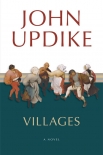Villages, John Updike [brene brown rising strong .TXT] 📗

- Author: John Updike
Book online «Villages, John Updike [brene brown rising strong .TXT] 📗». Author John Updike
In their two dark and dank basement rooms, whose little windows looked out on a leafy cat motel, Owen and Phyllis were gingerly immersed in one another. They learned the noises and movements each made while asleep and how each’s bowel movements smelled, even though the bathroom door was closed tight and an overhead fan could be switched on. Their bedroom was so small one of them had to sleep against the wall, and because he was the one who had to get up and go to work five mornings a week, she gave him the outside, which meant that if she had to arise in the night—having drunk too much wine at her parents’ table, perhaps, or at a spicy Greek restaurant with another young graduate couple—she slithered carefully across him, a constellation of touches passing close overhead. He would fall back asleep, in his dreams explaining to himself that he was married, that the body was that of his wife. She was still shy, and any passerby on the sidewalk could see into their windows with a downward glance, but on the stickiest nights she slept naked. His wife’s body never failed to move him. They made love less than he had imagined when a virgin, and the blame, he felt, was as much his as hers; he studied at night, and so did she, while WCRB emitted classical music on the top of the bureau in the corner. Even half-heard, a Beethoven symphony or Schubert sonata is demanding, leaving nothing to say that cannot be expressed with a sigh and the slap of a book at last shutting. When, on the eve of his reporting to Fort Devens for induction into the Army, she announced a missed period, it was as if she had become pregnant by a process of osmosis rather than a distinct instance of intercourse.
It was always he who initiated what contacts there were. Given his overexcited clumsiness once engaged, especially when a condom, hard-squeezing and smelling disgustingly of its rubber, had been utilized, as the alternative to her inserting a slathered diaphragm (she would emerge from the bathroom blushing), he could not blame her. He never could blame Phyllis for anything; perhaps this was a defect, a deformity, in their relationship. She was a year older, and he trusted her to be right; he never got over his first awed sightings of her in the halls of MIT’s busy maze of numbered buildings, its set of sets. How unattainable she had seemed! Just the notion of talking to her, of intruding himself into the sphere of her attention, had seemed blasphemous.
In that honeymoon week on the Cape they had walked on the beach toward Provincetown, a beach belonging to her girlhood summers, and, though it was still too cool for bathing suits, at a quiet shallow place she had taken off her shoes and waded in, her tugged-up skirt exposing half of her thighs and all of the swell and taper of her long white calves. Some young male walkers coming south from Provincetown had stopped to stare. They were burly and boisterous, and it did not occur to Owen that they might be homosexual. He was convinced they wanted his wife; they wanted to seize and rape her on the empty beach. With the force of a blow from behind, he awoke to his inability to protect her—his sheltered treasure, his innocent exhibitionist, his ex-virgin by the sea. He was a pathetic groom. The hazed sky was high and merciless. Beyond her sand-colored head of hair, guilelessly bowed in study of the shells and crabholes revealed in the suds of the surf’s retreat, there was only icy ocean and Portugal.
vii. On the Way to Middle Falls
His last dream before awaking is of a party, a party back in Middle Falls, though it seems to be in a skyscraper and has the gloss and high color of a party in a movie, a ’fifties movie, or a present-day film’s retro ’fifties, where the women are too dressed up, in powdery colors and wide-skirted, sharply cinched taffeta and rigidly waved hair. In the dream he slowly notices how the two female guests he is talking to, one of them seated beside him and the other standing, are both dressed in painted china, rigid carapaces with shiny sculptural edges, as if they are eighteenth-century figurines. In looking at the paintings of Copley or Gainsborough or Ingres, Owen can lose himself in the folds of silk, the semi-stiff fall and buckle of fabric, the highlights and the crevasses so passionately pursued by the painter’s brush at a remove from the rouged, indolent faces; these party clothes are like that, frozen ceramic, though the women’s arms appear soft and alive, gesturing playfully, and their voices and expressions animated and gracious, acknowledging no discomfort or impediment to their motions. Envious, Owen, feeling by comparison ill-dressed, finds himself in front of their host’s (whoever he is) closet, with its ranks of polished shoes and tweed jackets, looking for a porcelain suit he can put on. He is distracted from his search by noise from the party: an elderly guest has passed out, a halo of sleeping dogs around his head, and there seems to be a fox loose in the house. Eve, Owen’s younger daughter, is tearfully protecting the animal. This, then, is his house, the big clapboarded one on Partridgeberry Road in Middle Falls, Connecticut. So he is the mysterious host, humiliatingly ill-clad without a porcelain suit. He wakes up.
Julia is not in the bed, and the warm depression she leaves behind is cooling. He feels, more heavily each day, the unnaturalness of getting out





Comments (0)